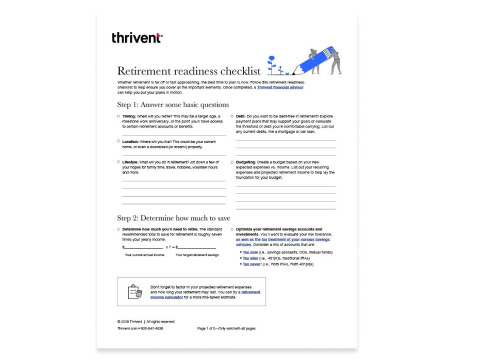How prepared do you feel for retirement? Not just financially, but logistically. Sometimes we are so focused on making sure we have enough savings for a secure future that we forget to think through the bigger picture.
Asking yourself these five retirement planning questions can help you sketch out a clear vision of a future that works for you—one that's focused on turning you and your family's unique hopes and dreams for your retirement years into something tangible.
1. At what age do you want to retire?
Thinking through your goals for retirement—including whether you'd like to retire earlier or later—is a crucial piece of the retirement puzzle. The
The age you plan to retire affects how much Social Security you qualify for as well as how much you'll need in savings to cover you throughout this new phase of your life.
When you start claiming Social Security matters
The Social Security Administration will consider you to be retired when you start
If you wait to retire until what's known as your
On the flip side, you can generally receive even more than your full benefit amount if you delay your retirement.
Here's a simplified example of how early, full and delayed Social Security benefits compare if your monthly benefit at a full retirement age of 67 is $1,000:
- If you start taking benefits at 62, your monthly amount would be $700.
- If you start taking benefits at 67, your monthly amount would be $1,000.
- If you start taking benefits at 70, your monthly amount would be $1,240.
If you're married, factoring in the age at which your spouse wants to retire can help you both

2. How many years of retirement will you need to pay for?
At the heart of this question is the uncomfortable prediction of how long you'll live. The
Whether you foresee yourself living on retirement funds for one decade or five, it's generally better to overprepare. After all, it's not just day-to-day expenses you'll need to cover. In addition to the fun stuff, like vacations and gifts to family members, you need to budget for
Longevity risk: Help ensure your retirement savings last by leveraging plans and products
It's natural to be concerned about living longer than you expect and straining your retirement savings, a peril that is known as
While your Social Security benefits will last as long as you live, you shouldn’t rely on them to fund your entire retirement. On average, Social Security will
That's why it's so important to invest in a mix of savings vehicles. Some of the most common options include:
Employer-sponsored retirement savings plans
Some tax-advantaged retirement plans offered by your employer, like
Why you should contribute to one:
- It's an easy way to divert a high annual contribution toward retirement.
- Your employer will often
match your contributions up to a certain percentage. - You can take advantage of tax-deferred
compound interest . - Traditional 401(k) contributions lower your taxable income each year and could move you into a lower tax bracket.
Traditional & Roth individual retirement accounts (IRAs)
Consider investing in an IRA if:
- You don't have an employer-sponsored retirement plan.
- You've already contributed the maximum amount to your employer-sponsored account and want to contribute more toward retirement.
- You want more investment options than your employer-sponsored account provides.
- You want to benefit from a potential immediate federal income tax deduction. (In this case, consider a traditional IRA.)
- You want to benefit from tax-free qualified distributions in the future. (Then consider a Roth IRA.)
Deferred annuities
A deferred annuity is an insurance contract that may provide retirement income over a specified period of time in exchange for a lump sum payment or premium payments. Regardless of how near or far away from retirement you are, you can defer your income stream until later to give your investment time to experience tax-deferred growth. Consider investing in a deferred annuity if:
- You want another guaranteed income source during retirement.
- You want to delay claiming Social Security benefits.
- You have already contributed the maximum amount to your IRAs or employer-sponsored retirement account.
Brokerage accounts
A
- You want flexibility in accessing your money. (Keep in mind: Tax-advantaged retirement accounts have strict contribution and withdrawal rules.)
- You are comfortable potentially paying taxes on your earnings (i.e., dividends, interest and/or capital gains) each year.
- You want to diversify your assets within a single account.
Are your retirement savings on track?
3. After retiring, will you move or stay in the same place?
One of the greatest perks of retirement may be the freedom to live wherever you want. That could be closer to loved ones, a faraway locale you've always adored or perhaps the very place you are right now.
As you think through where you want to live during retirement—based on your goals, income and health—consider these kinds of questions:
- If you want to stay in your house, will you be able to invest in home modifications for safe living as you age? The
national average cost of a new walk-in shower is $9,000, for instance. - Should you downsize in retirement? There could be both
financial advantages and drawbacks to moving to a smaller home. - If you move, do you have the interest and resources to buy a retirement home? Or would renting better suit your needs?
- Can you afford to live in your dream location? The
cost of living in a new area could be different from where you live now. Taxes, health care costs and housing prices can vary widely in different states.
4. What do you want to do after you retire?
You don't want to ask yourself 10 or 20 years after you've retired if you could've done more. In this way, retirement is the time for you to think big.
Heading into retirement doesn't mean your productivity is coming to an end. If you plan well for your retirement, it can be the era of your life when you're most able to pursue your passions. Achieving your best retirement life may just be a matter of determining what's significant to you—and going for it.
A
- Popular models of
induction stoves range from roughly $1,100 to $4,400 . - E-readers can vary in cost from less than
$200 to more than $500 . - The average new dog owner pays
around $1,750 in ownership expenses per year. - The average household
spends $616 per year on lawn and gardening activities. - Travelers age 70+
spend an average $6,777 on travel.
Get creative as you look toward your future. That's the advantage of starting retirement planning early—you have time to prioritize your big dreams and work the financial figures to see if you'll have what you need to pursue them full-force.
Or, maybe you're not be quite ready to leave the workforce altogether. A part-time job can provide some extra discretionary income. Of course, retirement can also be a time to pursue interests in ways you never could before. Understanding your goals can help you determine if your savings plan will get you there.
5. How could taxes impact your retirement funds?
While many aspects of your life may be different after you retire, taxes remain a constant. According to Thrivent's Retirement Readiness Survey*, 75% of those surveyed expressed some level of regret about the way they had planned for their retirement. The survey found that the most valuable piece of advice retirees would have given their younger selves would be to learn about tax implications for their retirement savings. Your tax professional and financial advisor can help you understand the tax liabilities you'll face in retirement.
You can also be proactive in finding ways to reduce your tax burden. You can strategize tax-efficient moves to incorporate into your retirement plan, for example, and work through options to minimize
In addition, the
The most valuable piece of advice retirees would have given their younger selves would be to learn about tax implications for their retirement savings.
Questions to ask a financial advisor about retirement
A financial advisor can help you navigate the complexities of retirement planning. Sometimes it's helpful to prepare a list of questions ahead of time.
Here are some to consider asking:
- How can I determine how much money I will need in retirement?
- Am I on track to be able to retire by my target date?
- When should I apply for Social Security benefits?
- What changes should I make to my retirement portfolio?
- How can I prepare for tax liabilities when I retire?
- What are some ways I can save for retirement while also pursuing other financial goals, like paying for my child's education?
- How can I plan for potential setbacks, like a job loss or major medical issue?
- What are the biggest financial mistakes I should avoid to have a secure retirement?







